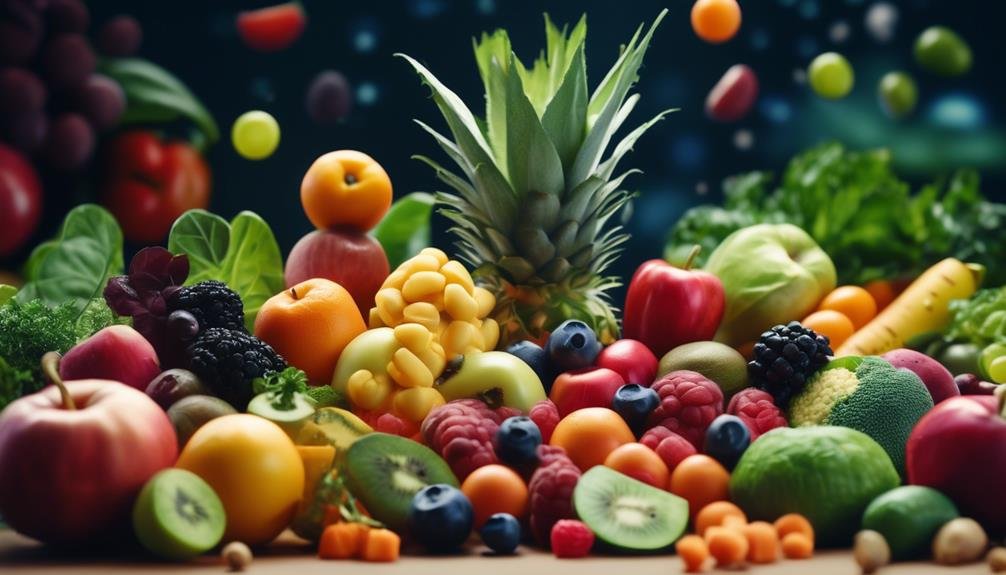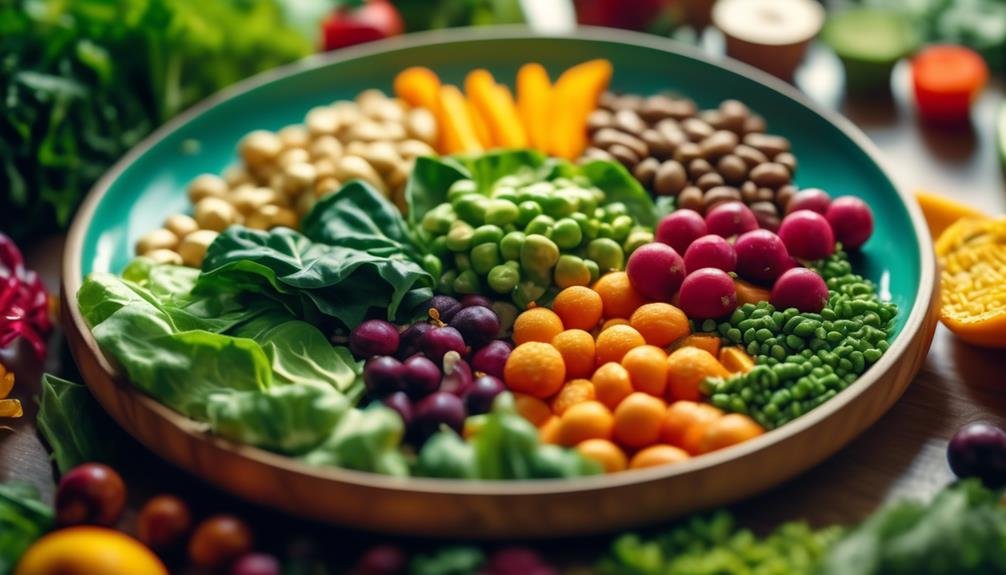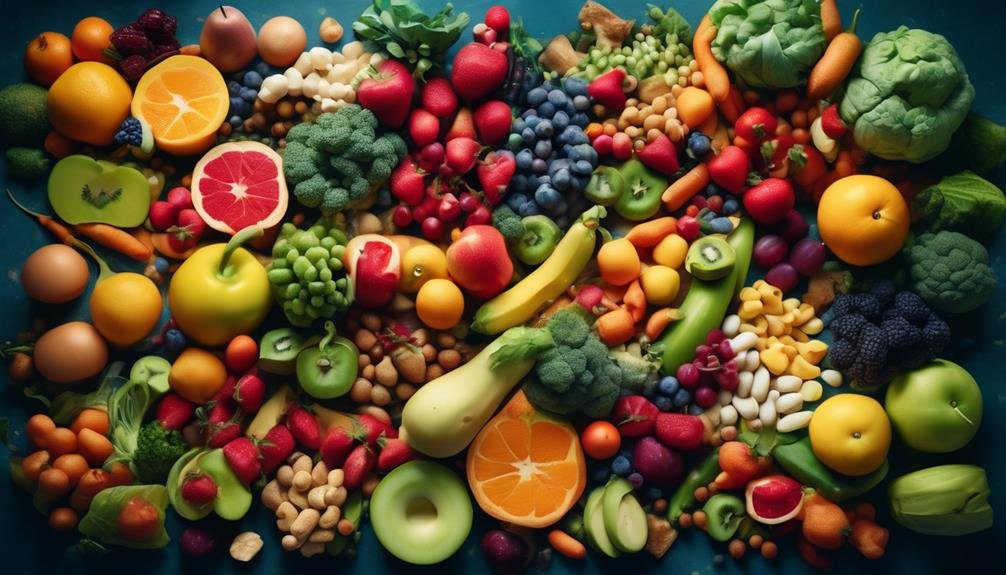They say, 'You are what you eat.' And as a parent, you want to ensure that your little one grows up healthy and strong. If you've chosen to raise your baby on a vegetarian diet, you may have questions about their nutrition. Well, fret not!
In this discussion, we will provide you with valuable tips and insights to navigate the world of vegetarian baby diet. From meeting their nutritional needs to dealing with picky eaters, we've got you covered.
So, let's dive in and discover the secrets to raising a thriving vegetarian baby.
Key Takeaways
- Vegetarian diets provide necessary nutrients for growth and development in babies.
- It is important to include a variety of plant-based protein sources in a vegetarian baby's diet, such as tofu, lentils, beans, and quinoa.
- Iron-rich foods should be incorporated into a vegetarian baby's diet, including fortified cereals, spinach, and legumes paired with vitamin C sources for better absorption.
- Consult a pediatrician for guidance on vitamin B12 supplements or fortified foods for vegetarian babies, as this nutrient is primarily found in animal products.
Benefits of a Vegetarian Diet

What are the benefits of adopting a vegetarian diet for your baby?
There are numerous health advantages to introducing a vegetarian diet to your baby's meal plan. Research suggests that vegetarian diets can provide all the necessary nutrients for your baby's growth and development. By incorporating a variety of plant-based foods into their diet, your baby can receive essential vitamins, minerals, and antioxidants that promote optimal health.
One of the key benefits of a vegetarian diet for your baby is a reduced risk of chronic diseases later in life. Studies have shown that individuals who consume a plant-based diet have lower rates of obesity, heart disease, and certain types of cancer. By starting your baby on a vegetarian diet, you're setting them up for a healthier future.
Additionally, a vegetarian diet can support the development of a strong immune system. Plant-based foods are rich in nutrients that boost the immune system, such as vitamin C and antioxidants. This can help your baby fight off infections and maintain good overall health.
Furthermore, a vegetarian diet can promote healthy digestion in your baby. Plant-based foods are typically high in fiber, which aids in digestion and prevents constipation. This can contribute to a smoother and more comfortable digestive system for your little one.
Nutritional Needs of a Vegetarian Baby
By understanding the nutritional needs of your vegetarian baby, you can ensure that they receive all the essential nutrients for their growth and development. As you embark on the journey of raising a vegetarian baby, it's important to plan their meals carefully to meet their dietary requirements. Here are some tips to help you with vegetarian baby meal ideas and meal prep:
- Protein: Make sure your baby gets enough protein by including plant-based sources such as tofu, lentils, beans, and quinoa in their meals. These foods are rich in protein and can be easily incorporated into their diet.
- Iron: Iron is crucial for your baby's brain development and overall growth. Include iron-rich foods like fortified cereals, spinach, and legumes in their meals. Pairing these foods with sources of vitamin C, such as citrus fruits or tomatoes, can enhance iron absorption.
- Calcium: Calcium is essential for strong bones and teeth. Offer your baby calcium-rich foods like broccoli, kale, fortified plant-based milk, and tofu.
- Omega-3 fatty acids: Include foods like chia seeds, flaxseeds, and walnuts in your baby's diet to ensure they receive adequate omega-3 fatty acids for brain development.
- Vitamin B12: As a vegetarian, it's important to supplement your baby's diet with vitamin B12, which is primarily found in animal products. Consult your pediatrician for appropriate supplements or fortified foods.
Remember to consult with a healthcare professional to ensure your baby's nutritional needs are being met. With careful planning and creativity, you can provide a well-balanced vegetarian diet for your little one.
Introduction to Solid Foods

When introducing solid foods to your vegetarian baby, it's important to consider their nutritional needs and choose appropriate options for their growth and development. Starting solids is an exciting milestone for your little one, and it's a great opportunity to introduce new flavors and textures to their diet. As a vegetarian, you have a wide range of nutritious options to offer your baby.
When starting solids, begin with single-ingredient foods such as mashed avocado, pureed sweet potatoes, or cooked and mashed lentils. These foods are easy to digest and provide essential nutrients like healthy fats, carbohydrates, and protein. You can gradually introduce a variety of fruits, vegetables, whole grains, and legumes to expand their palate.
As you introduce new flavors, it's important to watch for any signs of allergies or intolerances. Start with small amounts and observe how your baby reacts. If they show any signs of discomfort, rash, or digestive issues, consult your pediatrician.
Remember to offer a balanced diet that includes a variety of food groups. Your baby's nutritional needs can be met by combining different plant-based sources of protein, such as beans, tofu, quinoa, and fortified cereals. By introducing a variety of flavors and textures, you can help your baby develop a diverse and healthy vegetarian diet.
Essential Nutrients for Vegetarian Babies
To ensure your vegetarian baby receives all the necessary nutrients for healthy growth and development, it's important to understand the essential nutrients they need from a plant-based diet. While a well-planned vegetarian diet can provide all the nutrients your baby needs, there are a few key nutrients that require special attention.
Here are some essential nutrients for vegetarian babies:
- Iron: Iron is crucial for your baby's brain development and overall growth. Good vegetarian sources of iron include fortified cereals, tofu, beans, lentils, and dark leafy greens like spinach and kale.
- Protein: Adequate protein intake is vital for your baby's muscle and tissue development. Plant-based sources of protein for vegetarian babies include lentils, chickpeas, tofu, quinoa, and nut butters.
- Omega-3 Fatty Acids: These healthy fats are important for your baby's brain and eye development. Flaxseeds, chia seeds, walnuts, and algae-based supplements are excellent vegetarian sources of omega-3 fatty acids.
- Vitamin B12: Vitamin B12 is essential for your baby's nervous system development. It's primarily found in animal products, so it's important to include fortified foods like plant-based milks, cereals, and nutritional yeast in your baby's diet.
- Calcium: Calcium is crucial for strong bones and teeth. Vegetarian sources of calcium include fortified plant-based milks, tofu, sesame seeds, broccoli, and leafy greens like collard greens and bok choy.
Plant-Based Protein Sources

Plant-based diets can provide an abundance of protein sources to ensure your vegetarian baby receives adequate protein for healthy growth and development. While meat is a common source of protein, there are plenty of alternatives for your baby's plant-based diet.
Legumes, such as lentils, chickpeas, and black beans, are excellent sources of protein and can be easily included in your baby's meals. You can puree cooked legumes to make a smooth and nutritious spread or dip.
Another great option is tofu, which is made from soybeans and is rich in protein. Soft tofu can be mashed and added to purees or used to make plant-based protein recipes like tofu scramble.
Quinoa, a grain-like seed, is also a complete protein source and can be cooked and mixed with vegetables for a delicious and nutritious meal.
Other alternatives to meat proteins include tempeh, edamame, and seitan. Incorporating these plant-based protein sources into your baby's diet will ensure they receive the necessary nutrients for their growth and development.
Incorporating Iron-Rich Foods
Incorporating iron-rich foods is crucial for ensuring your vegetarian baby receives the necessary nutrients for healthy growth and development. Iron plays a vital role in the production of hemoglobin, which is responsible for carrying oxygen to all parts of the body. As a vegetarian, you may be wondering how to provide your baby with enough iron without relying on meat. Fortunately, there are plenty of plant-based iron sources available.
Here are some ways to incorporate iron-rich foods into your baby's diet:
- Include legumes: Lentils, chickpeas, and beans are excellent sources of iron. Puree them into soups, stews, or mashed vegetables to make them more appealing to your little one.
- Offer fortified cereals: Look for iron-fortified cereals specifically designed for babies. These cereals are a convenient and easy way to boost your baby's iron intake.
- Try leafy greens: Spinach, kale, and broccoli are packed with iron. Steam or puree them and mix them into your baby's meals.
- Pair iron-rich foods with vitamin C: Vitamin C enhances iron absorption. Serve foods like oranges, strawberries, or bell peppers alongside iron-rich meals.
- Experiment with iron-rich vegetarian recipes: Get creative in the kitchen by trying out recipes that incorporate iron-rich ingredients like tofu, quinoa, and nuts.
Vitamin and Mineral Supplements

One important consideration for ensuring your vegetarian baby receives adequate nutrition is the use of vitamin and mineral supplements. While a well-planned vegetarian diet can provide most of the necessary nutrients, there are a few vitamins and minerals that may require additional supplementation.
Vitamin B12 is one nutrient that's particularly important for vegetarian babies, as it's mainly found in animal-derived foods. Vegetarian sources of B12, such as fortified cereals and soy products, may not provide enough for your baby's needs. Therefore, it's recommended to consult with a healthcare provider about the best way to supplement your baby's B12 intake.
Another nutrient to pay attention to is iron. Although iron can be obtained from plant-based sources like legumes and leafy greens, the absorption of iron from these foods isn't as efficient as from animal sources. Therefore, it may be necessary to supplement your baby's diet with iron drops or a multivitamin that contains iron. Again, it's crucial to consult with a healthcare provider to determine the appropriate dosage for your baby.
Avoiding Common Nutritional Deficiencies
To ensure your vegetarian baby receives optimal nutrition, it's important to be mindful of common nutritional deficiencies. While a vegetarian diet can provide all the necessary nutrients for your little one's growth and development, there are a few key areas to pay attention to in order to prevent any potential deficiencies.
Here are some tips to help you avoid common nutritional deficiencies in your vegetarian baby's diet:
- Ensuring an adequate intake of iron-rich foods: Iron is essential for your baby's brain development and overall growth. Include iron-rich foods like legumes, tofu, and fortified cereals in their diet. Pairing these foods with a source of vitamin C, such as fruits or vegetables, can enhance iron absorption.
- Introducing omega-3 fatty acids: Omega-3 fatty acids are crucial for brain and eye development. Incorporate plant-based sources of omega-3s, such as flaxseeds, chia seeds, and walnuts, into your baby's meals. You can grind the seeds and add them to purees or sprinkle them on top of foods.
Creating Balanced Meal Plans

To create balanced meal plans for your vegetarian baby, focus on incorporating a variety of nutrient-dense plant-based foods.
Meal planning plays a crucial role in ensuring your little one gets all the necessary nutrients for healthy growth and development. Start by offering a wide range of fruits and vegetables to provide essential vitamins, minerals, and antioxidants.
Include whole grains such as quinoa, brown rice, and oats to provide energy and fiber. Legumes like lentils, chickpeas, and beans are excellent sources of protein, iron, and zinc.
Don't forget to incorporate plant-based sources of omega-3 fatty acids, such as chia seeds, flaxseeds, and walnuts, for brain and eye health. Dairy alternatives like fortified soy milk or almond milk can provide calcium and vitamin D.
Lastly, ensure your baby gets enough vitamin B12, which is primarily found in animal products, by offering fortified foods or discussing supplementation with your pediatrician.
Remember to consult with a healthcare professional or registered dietitian to ensure your baby's meal plan is nutritionally adequate and meets their specific needs.
With careful meal planning and a variety of foods, you can provide your vegetarian baby with a well-rounded and balanced diet.
Dealing With Picky Eaters
If your vegetarian baby is a picky eater, there are strategies you can implement to encourage them to try new foods and expand their palate. Mealtime struggles can be frustrating, but with patience and creativity, you can overcome them. Here are some tips to help you deal with picky eaters:
- Make mealtime enjoyable:
- Create a positive atmosphere by sitting down together as a family and engaging in pleasant conversation.
- Set a good example by eating a variety of foods yourself, showing your baby that trying new flavors is exciting.
- Introduce new flavors gradually:
- Start by incorporating small amounts of new foods into familiar dishes. For example, mix finely grated vegetables into mashed potatoes or blend fruits into smoothies.
- Offer a variety of colors, textures, and flavors to stimulate your baby's interest. Remember, it may take several attempts before they accept a new food.
- Get creative with presentation:
- Cut fruits and vegetables into fun shapes or arrange them into colorful patterns on the plate.
- Serve meals in small portions and allow your baby to explore and experiment with their food. This can make mealtime more interactive and engaging.
Tips for a Smooth Transition to a Vegetarian Diet

A smooth transition to a vegetarian diet can be achieved by gradually incorporating plant-based foods into your baby's meals. Here are some tips to help you navigate this process smoothly.
First, it's important to introduce new foods one at a time. This allows your baby to adjust to the taste and texture of each new item. Start with small portions and gradually increase the amount as your baby becomes more comfortable.
When it comes to transitioning, try to mimic familiar flavors and textures. For example, you can puree vegetables and mix them with a familiar food, such as mashed potatoes or rice. This helps your baby associate the new food with something they already enjoy.
Experiment with different vegetarian meal ideas to keep things interesting. For protein, you can offer mashed beans or lentils, tofu, or quinoa. Leafy greens like spinach and kale can be pureed and added to soups or pasta sauces. Don't forget about fruits and vegetables, which are packed with essential vitamins and minerals.
Remember to consult with your pediatrician before making any major changes to your baby's diet. They can provide guidance specific to your baby's needs and ensure that they're getting all the necessary nutrients.
Frequently Asked Questions
Can I Raise My Baby on a Vegan Diet Instead of a Vegetarian Diet?
You can raise your baby on a vegan diet instead of a vegetarian diet. There are benefits to both diets, but it's important to ensure your baby gets all the necessary nutrients for healthy growth and development.
What Are Some Common Signs of Nutritional Deficiencies in Vegetarian Babies?
You know when your little one is missing out on key nutrients in their vegetarian diet? Look for signs like fatigue and pale skin. Iron and vitamin B12 are especially important for their growth and development.
Are There Any Specific Fruits or Vegetables That Are Important to Include in a Vegetarian Baby's Diet?
To ensure a well-rounded vegetarian baby diet, it's important to include a variety of fruits and vegetables. Leafy greens like spinach and kale offer numerous health benefits. Introduce different flavors and textures gradually for a diverse palate.
How Can I Ensure My Vegetarian Baby Is Getting Enough Calcium Without Consuming Dairy Products?
To ensure your vegetarian baby gets enough calcium without dairy, focus on plant-based sources like tofu, leafy greens, beans, and fortified non-dairy milk. Consult with a pediatrician to create a balanced diet plan.
Are There Any Potential Risks or Concerns Associated With Raising a Vegetarian Baby?
Potential health risks and nutrient deficiencies are concerns when raising a vegetarian baby. Ensure they receive proper nutrition by including a variety of plant-based foods rich in calcium, iron, protein, and vitamins.
Conclusion
In conclusion, introducing a vegetarian diet to your baby can provide numerous health benefits and meet their nutritional needs.
Did you know that studies have shown that vegetarian children tend to have lower rates of obesity and are more likely to meet their recommended intake of fruits and vegetables?
By incorporating a variety of plant-based protein sources and creating balanced meal plans, you can ensure your vegetarian baby receives all the essential nutrients for healthy growth and development.
Remember to consult with a healthcare professional for personalized advice.




